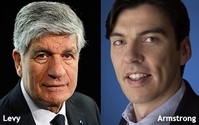 Is AOL going to merge with Yahoo? It was the subject of some speculation this summer after the CEOs of the two companies — Tim Armstrong and Marissa Mayer respectively — were
seen chatting at a C-level industry retreat this summer. And the speculation rekindled last week after activist investment firm Starboard Value wrote a letter to Mayer demanding action to improve
shareholder value, including exploring a possible merger with AOL.
Is AOL going to merge with Yahoo? It was the subject of some speculation this summer after the CEOs of the two companies — Tim Armstrong and Marissa Mayer respectively — were
seen chatting at a C-level industry retreat this summer. And the speculation rekindled last week after activist investment firm Starboard Value wrote a letter to Mayer demanding action to improve
shareholder value, including exploring a possible merger with AOL.
So when Armstrong took the stage Thursday morning with Publicis Groupe CEO Maurice Levy for a lively conversation at an
Advertising Week session, Levy — after some playful teasing about his “affair” with Marissa — asked Armstrong flat out whether such a merger was
likely to occur.
advertisement
advertisement
While he did not dismiss the possibility completely, Armstrong downplayed such an eventuality. “It’s a non-factor,” Armstrong responded, asserting that the
company was focused and “super busy” on non-merger-related activities. And in a reference to the size difference between the two companies (Yahoo’s market capitalization is about 10
times that of AOL), Armstrong contended that AOL would be a “sideshow” to anything Yahoo did in the merger arena.
Then it was Armstrong’s turn to probe. Last month Publicis
disclosed a deal with Adobe that it said would create a new holding company operating model. What does that mean exactly? Armstrong wanted to know. The Publicis chief replied that the agreement would
enable the company to better connect with consumers in the “always on” world that the communications landscape has evolved to. “This is what clients expect.”
Clients
and agencies alike, added Levy, utilize processes and organizations that “are irrelevant for tomorrow.” He and his team are working on creating “the right recipe. We live in a world
that cannot wait and we have to transform ourselves or become irrelevant.”
That said, Armstrong noted, Publicis has also acquired a handful of creative and design shops in recent months.
“What’s the future of creative?” Armstrong asked. Those acquisitions, responded Levy, are part of a strategy to “complete the network essentially. At the end of the day you
need to find the right idea,” he said. Computers and algorithms may help with the execution, but “the right idea solves the problem.”
Asked what his priorities are between
now and 2017 when he is scheduled to step down as CEO, Levy replied that to “prepare the succession” is at the top of the list. The second priority is to help set the company’s
strategic course for the next decade.
Priority number three, he added, is “helping clients transform themselves. They need to change as much as agencies do."
Armstrong asked Levy
about competitive relationships and Levy told of an early encounter he had with WPP CEO Martin Sorrell. In 1980 Sorrell -- who was still group finance director at Saatchi & Saatchi -- wanted
Publicis to join Saatchi in acquiring DFS Compton as a 50-50 partner.
After visiting London for a day and getting to know Sorrell and the Saatchi brothers a little bit, Sorrell asked him what
he thought of the proposal, recalled Levy. He said he couldn’t recommend that Publicis participate in the deal and when Sorrell asked why, Levy replied: “Because I have a feeling your 50%
would have more clout.” That set the tone, Levy said, for what has been a somewhat contentious relationship with Sorrell ever since.
Competition does get personal, said Levy.
“It’s emotional and passionate because you want to win.” In French, he added, there is an expression that conveys the idea that in order for a victory to be fully satisfactory,
“I need to know my adversary is unhappy.”
When Armstrong asked about the global economy, Levy likened it to “walking in a minefield. There’s always something crashing
down.”
The good news, said Levy, is that client balance sheets are very strong — offering opportunities for expansion and further investments in advertising.
And what will
he do after stepping down? For one thing, Levy said, he will devote more time to the Peres Center For Peace (he’s chairman of the group’s international board) and delving into the
complicated issues surrounding the relationship between the Palestinians and Israelis.